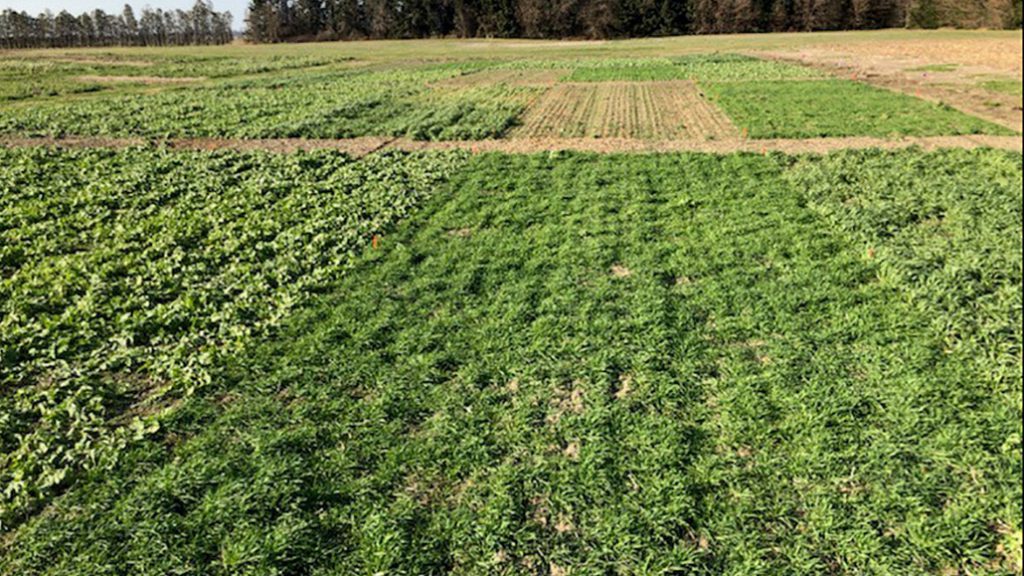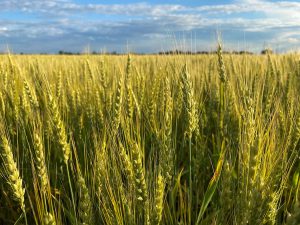Long-term cover crop research
NEW YIELD FINDINGS

DR. LAURA VAN EERD, professor of sustainable soil management at the University of Guelph, is managing two state-of-the-art long term cover crop research trials at the Ridgetown Campus. Established in 2007 and 2008, these trials are focused on comparing five cover crops and are likely the longest established experiments in Canada and the midwestern U.S.
“We are seeing differences in weeds and in N but 2020 was the first year that we saw a grain corn yield response,” says Van Eerd.
The data indicates there was a 60 bushel per acre increase after annual cover crops were planted 10 times in 13 years. Since the 2020 season started off dry, she believes her findings showcase the resiliency of long term cover crop use.
“The cover crops have increased soil organic matter. We saw increases after eight years and again when we sampled last year. We tended to have higher grain yield in the plots where we had higher organic matter. That’s resiliency — maintaining crop productivity even when weather conditions are challenging.”
Van Eerd notes increases in soil health, soil organic carbon, yield, and partial profit margins in her research thus far. The rotation includes both grains and processing vegetables and the latter is a contributing factor to the profitability findings specifically.
Through the long term rotation trials in Ridgetown, University of Guelph associate professor, Dr. Dave Hooker, has seen yield increases after growing wheat with and without underseeded red clover.
The data indicates that wheat in the rotation increases corn yield by six to 17 bushels per acre and soybean yield by five bushels per acre. An additional corn yield increase of 6.7 bushels per acre is noted when wheat is grown with underseeded red clover.
“This research paints a different picture in terms of whether wheat is economically favourable in a corn-soybean rotation. Wheat has a lot of benefits – one is that it enables us to include red clover in the rotation,” he explains.
LONG-TERM FOCUS
Hooker started long term cover crop trials in Elora and Ridgetown with associate professor Dr. Bill Dean (retired), professor Dr. Manish Raizada, and Van Eerd in 2017.
The experiments involve a corn-soybean rotation with two cover crop treatments (no cover crop and cereal rye) and a corn-soybean-wheat rotation with six cover crop treatments (no cover crop, underseeded red clover, oat, oat/radish/crimson clover drilled, 10-way, and 10-way/cereal rye). N rate effect is also being studied as 50 pounds of N per acre is applied to some plots.
“The main questions we have are about the long term effects of implementing a cover crop strategy. There is very little data in the literature looking at various cover crop intensities in the long term, but this is what growers need,” says Hooker.
In the first four years of the trials, he has found no evidence that cover crops increase corn yield or that cover crop mixtures outperform monocultures.
Applying N after wheat has shown to increase above ground cover crop biomass by an average of 50 per cent, increase the N in the cover crop biomass and reduce the carbon-to-N ratio. Farmers could also grow red clover or apply manure to ensure the cover crop is not N deficient, he says.
“There are other studies showing us that if you don’t want to grow winter wheat, maybe grow something else in the fall as a cover crop,” says Raizada. “Just the N benefit alone is really significant and perhaps there is this resiliency benefit. We know the climate is changing and we have increased hot and dry periods in the summer. What a great potential insurance policy this is and perhaps cover crops do represent the future for us here in Ontario.”
This article is based on information provided during a session of the Ontario Agricultural Conference. Grain Farmers of Ontario was a sponsor of this conference. •











